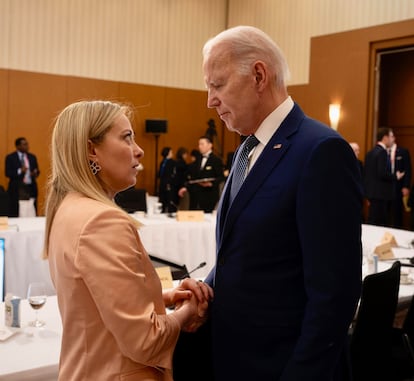Biden seeks to convince Meloni to give up the new Silk Road
The U.S. president will meet with the Italian prime minister on Thursday, and try to persuade her to back out of China’s Belt and Road Initiative

Italian Prime Minister Giorgia Meloni landed in Washington on Thursday, where she will meet with U.S. President Joe Biden. The meeting, publicized in style by the Italian delegation, will enable both sides to discuss the various common issues on their international agenda. It’s also an opportunity for Meloni to counter the perception that she is closing off Italy from the world. But, above all, it’s a chance to solve a problem left to Meloni by former Italian prime minister Giuseppe Conte: Italy’s participation in the Belt and Road Initiative (BRI) project, commonly known as the new Silk Road.
The issues that Italy and the United States share on their international agenda are only of moderate importance. Beyond the shipment of arms to Ukraine and negotiating support to address the financial crisis in Tunisia in order to prevent an increase in migratory flows to Europe via Italy, everyone is thinking of China. The United States was stunned when Italy entered into the agreement with the Asian giant and is now trying, with varying degrees of subtlety, to reverse the situation. The problem is that if Italy does not renew its agreement with China, it would face trade retaliation at a time when it cannot afford any economic setback.
Italy is under enormous pressure from both sides. Meanwhile, the European Union is stepping up its new policy of “de-risking” its economy from China. In other words, the EU wants to be less reliant on China when it comes to strategic sectors, such as critical materials. If Italy is convinced to back out of the new Chinese Silk Road, it would be a major victory for the new policy, which is aligned with U.S. interests, and set to shape other geopolitical areas.
In March 2019, Italy became the first G-7 country to join the BRI — an ambitious infrastructure project from Beijing that aims to connect Europe, the Middle East and Asia. Despite the misgivings of the EU, which considers China a “systemic rival,” Chinese President Xi Jinping and then-Italian leader Giuseppe Conte sealed a memorandum of understanding in Rome, and Italy entered China’s great infrastructure network, which is spread over the five continents, and includes around 30 collaboration agreements in different fields.
At the time the agreement was signed, Italy was in the grips of technical recession and desperately in need of investment and financing. The country believed that joining the new Silk Road could help ease its financial troubles. China, on the other hand, saw in the Italian ports the ideal spot from which to spread its products and investments. It was also aware of the political and symbolic value of a deal with Italy, and how this would strengthen its role at a global level. The idea of signing an agreement with China had been percolating away for years in Italy. But in the end, it was the Conte government — a coalition of the 5-Star Movement (M5S) and Lega — that sealed the deal.
The negotiations between Italy and China, however, were hampered by pressure from the EU and the U.S., which were worried about China gaining a stronger foothold in Europe. Of the 50 planned agreements, only 29 were signed. What’s more, Italy blocked Huawei, the leading Chinese company in fifth-generation mobile technology, from developing Italy’s 5G networks.
Biden invited Meloni to the U.S. during a phone call on June 26, although no specific date was set at that time. The talk, in which both leaders affirmed their “unwavering support for Ukraine,” came a day after the U.S. president spoke with his French, German and British counterparts about the Russian invasion. For Meloni, the Washington trip is an endorsement of her international policy. The Italian prime minister has touted her approach to foreign policy, despite the difficulties the country is facing: the EU has frozen a tranche of Italy’s post-pandemic funds, while irregular immigration has multiplied since she took office.
Sign up for our weekly newsletter to get more English-language news coverage from EL PAÍS USA Edition
Tu suscripción se está usando en otro dispositivo
¿Quieres añadir otro usuario a tu suscripción?
Si continúas leyendo en este dispositivo, no se podrá leer en el otro.
FlechaTu suscripción se está usando en otro dispositivo y solo puedes acceder a EL PAÍS desde un dispositivo a la vez.
Si quieres compartir tu cuenta, cambia tu suscripción a la modalidad Premium, así podrás añadir otro usuario. Cada uno accederá con su propia cuenta de email, lo que os permitirá personalizar vuestra experiencia en EL PAÍS.
¿Tienes una suscripción de empresa? Accede aquí para contratar más cuentas.
En el caso de no saber quién está usando tu cuenta, te recomendamos cambiar tu contraseña aquí.
Si decides continuar compartiendo tu cuenta, este mensaje se mostrará en tu dispositivo y en el de la otra persona que está usando tu cuenta de forma indefinida, afectando a tu experiencia de lectura. Puedes consultar aquí los términos y condiciones de la suscripción digital.









































